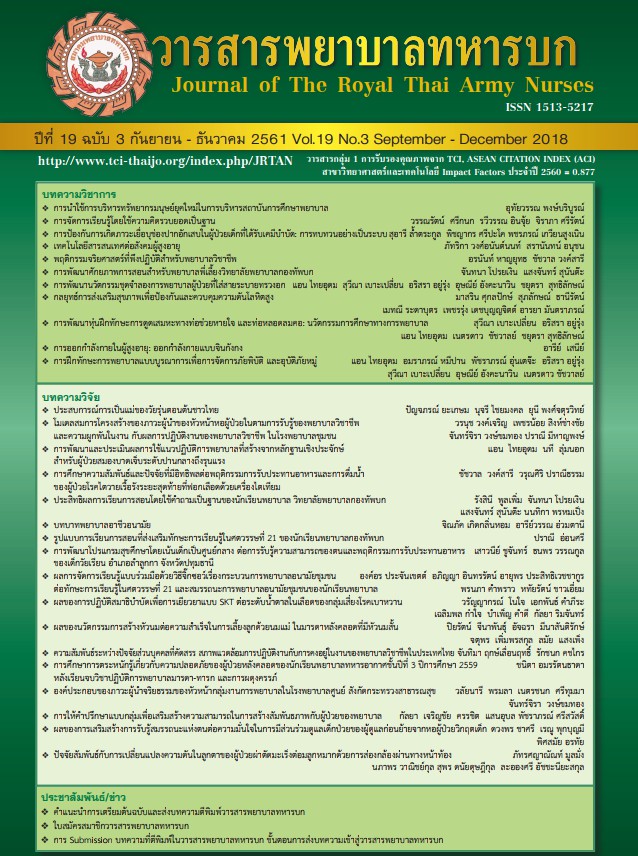The Royal Thai Army Nursing College Mentorship Potential Promoting for Nurse Mentor
Keywords:
Potential Promoting, Mentorship instruction, Nurse MentorAbstract
Nurse mentors are important in practical section of nursing students courses that help nursing student to gain knowledge, practice nursing skill and have a good attitude. Thus, the nurse mentor have to be intellectual and have potentiality in nursing skills, nursing instruction, good role model, adequate counseling skills, supportive-promotive skills and nursing practical evaluation. This article is indicated about emphasis of mentorship potential promoting for nurse mentors and perform roles of nurse mentors, in order to guide for improving mentorship potentiality that lead to the efficient nurse mentors.
Downloads
References
2. Bandansin J., Poonchai S., Chaleoykitti S. and Kanglee K. Practices in Preceptor’s Role of Professional Nurse in the Training Places of The Royal Thai Army Nursing College. Journal of The Royal Thai Army Nurse. 2015; 16(3): 32-41. (in Thai)
3. Thata S. and Yana A. Perception of Nursing Student on Their Nursing Skills and Their Professional Attiyudes After Their First Clinical Practice, Boromrajonani College of Nursing, Phayao. Nursing Public Health and Education Journal. 2013; 15(2): 46-54. (in Thai)
4. Kraichan S., Naulkaew T., Yowhaphui P. and Suriya N. The Leadership and Teamwork as Perceived by nursing Student of Nurse Preceptor of Nursing Administration Practicum, Srimahasarakham College of Nursing. Journal of Nurses’ Association of Thailand, North-Eastern Division. 2013; 31(1): 169-176. (in Thai)
5. Charleston R. and and Happel B. Coping with Uncertainty within the Preceptorship Experience: The Perception of Nursing Student. Journal of Advanced Nursing. 2005; 12(1): 25-30.
6. Plodpluang U. Competencies of Preceptor. Prince of Naradhiwas University Journal. 2016; 8(3): 168-174. (in Thai)
7. Rodphothong J., Puttapitukpol S. and Likhitluecha N. Development of Nurse Mentorship Model for New Professional Nurses, Pakkred Hospital, Nonthaburi Province. Journal of Nursing Division. (2016); 43(2): 66-82. (in Thai)
8. Tungtragul P., Jantarawijit Y., Suntayakorn S. and Prachanban P. Factors Influencing The Performance of Nurse Mentors Roles at Buddhachinaraj Hospital. Journal of Nursing and Health Science. 2014; 8(3): 39-51. (in Thai)
9. Numfone N., Wuttiwat N. and Cheevakasemsook A. Knowledge, Attitude and Clinical Teaching Performance to Nursing Student of Nurse in Private Hospital through Nursing Preceptor System with One-to-One Ratio Approch. Chula Med Journal. (2007); 51(11): 529-539. (in Thai)
10. Bandura A. (1986). Social Foundations of Thought and Action : A Social cognitive Theory. Englewood Cliffs, N.J.: Prentice Hall.
11. Dawudom N. and Srisatidnarakul B. The Components of Competency of Mentors in Nursing. Journal of Nursing Science Chulalongkorn University. (2009); 21(1): 50-63. (in Thai)
12. Prombuasri P., Intana J., Srimahunt K. and Meeboonmark Y. Curriculum Development of Humanized Care Competencies of preceptor in Practicum Setting of Boromarajonani College of nursing, Ratchaburi. Journal of Nursing and Education. 2015; 8(1): 129-151. (in Thai)
13. Kanmali Y. and Suikraduang A. Role of Nurse Preceptor, Socialization and Learning Management in Practice. The Journal of Boramarajonani College of Nursing, Nakhonratchaasima. 2017; 23(1): 124-130. (in Thai)
14. Phommavanh M. and Juntachum W. Practices of Clinical Nurse’s Preceptorship Role in Central Hospital of Vientiane Capital, Lao People’s Democratic Republic. Journal of Nurses’association of Thailand, North-Eastern Division. (2013); 31(3): 144-153. (in Thai)
15. Prousoontorn M. and Oumtanee A. Working as a Mentorship of Professional Nurses. Journal of Nursing Science Naresuan University. 2008; 2(2): 15-23. (in Thai)
Downloads
Published
How to Cite
Issue
Section
License
บทความหรือข้อคิดเห็นใดใดที่ปรากฏในวารสารพยาบาลทหารบกเป็นวรรณกรรมของผู้เขียน ซึ่งบรรณาธิการหรือสมาคมพยาบาลทหารบก ไม่จำเป็นต้องเห็นด้วย
บทความที่ได้รับการตีพิมพ์เป็นลิขสิทธิ์ของวารสารพยาบาลทหารบก
The ideas and opinions expressed in the Journal of The Royal Thai Army Nurses are those of the authors and not necessarily those
of the editor or Royal Thai Army Nurses Association.






